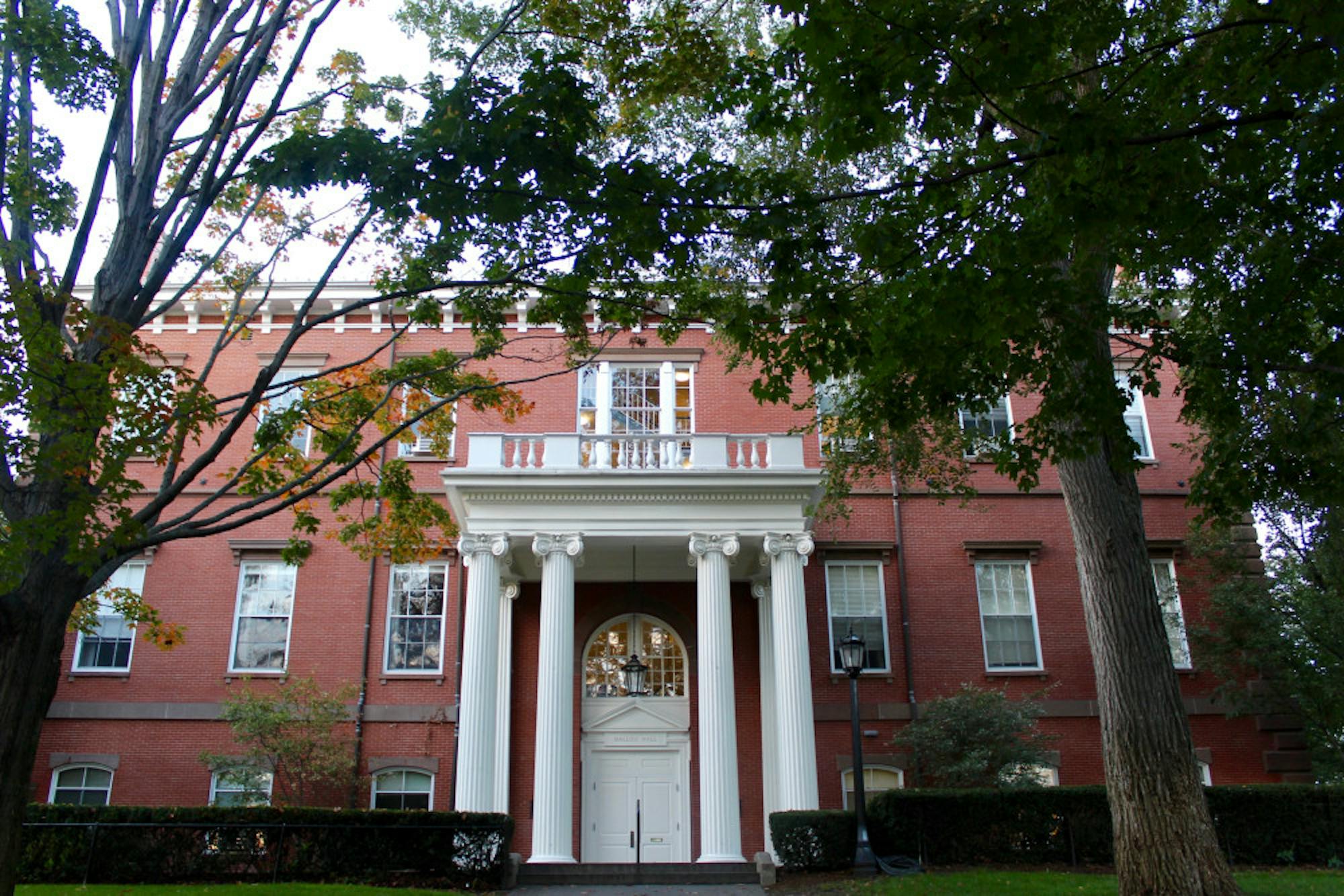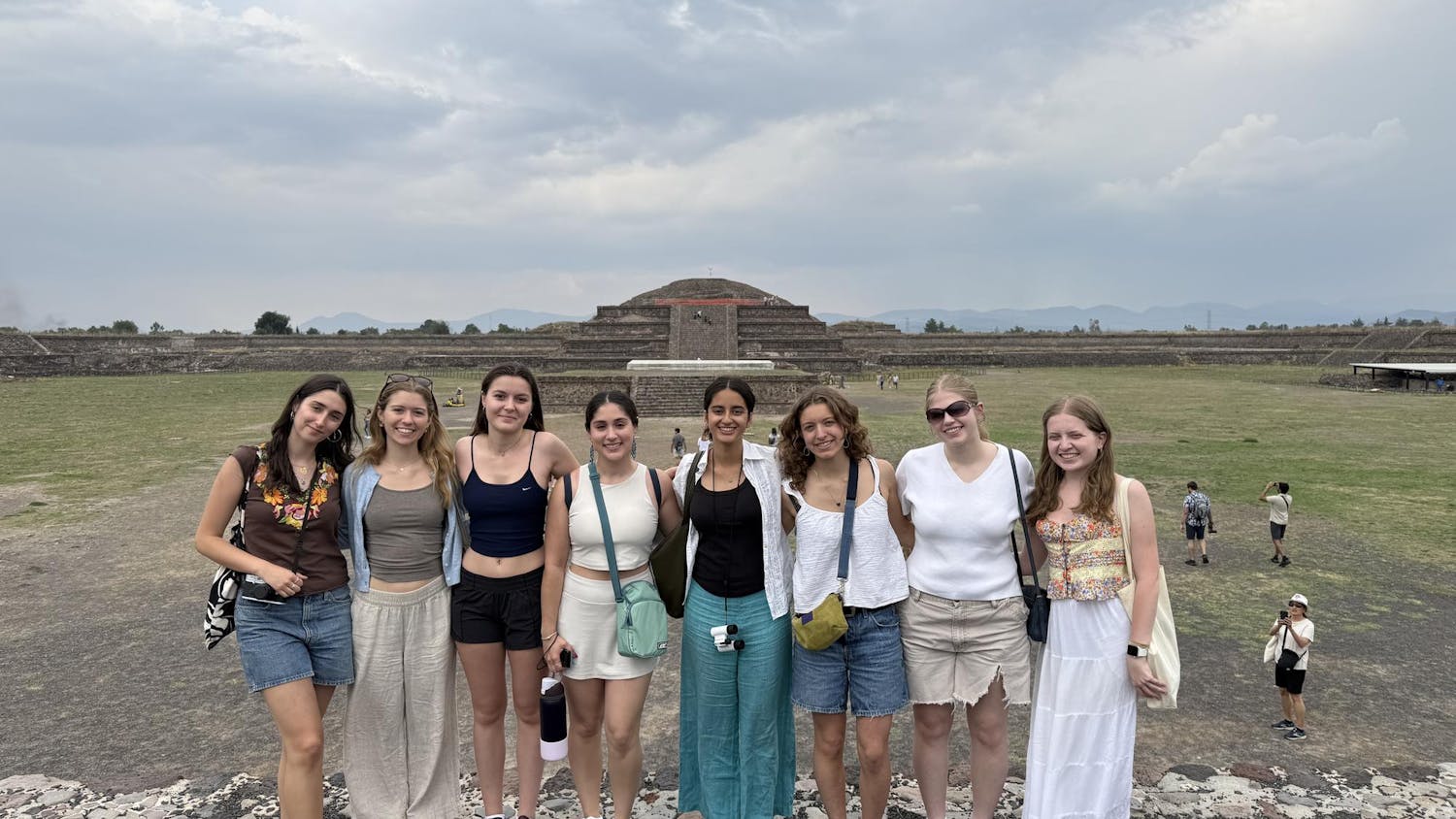Editor's note: This is the second part of a two-part series on how changes in H-1B work visa policy under the Trump administration are affecting Tufts. The first part was published on March 28, and is posted online.
Of the many policies that change from one presidential administration to the other, immigration is one that especially affects the lives and jobs of many members of the Tufts community. For instance, the Buy American, Hire American executive order, which was signed by President Trump on April 18, 2017, made changes to the policy on H-1B visas. H-1B visas are awarded to foreign employees who are working in American specialty professional occupations, and many Tufts faculty and staff rely on H-1B visas to work at the university.
“[This executive order] seeks to create higher wages and employment rates for U.S. workers and to protect their economic interests by rigorously enforcing and administering U.S. immigration laws,” Senior International Officer and Associate Provost Diana Chigas told the Daily in an email. “It also directs the Department of Homeland Security, in coordination with other agencies, to advance policies to help ensure H-1B visas are awarded to the most-skilled or highest-paid beneficiaries.”
The main consequence of these changes is the effect on time; the processes now are much slower and more time-consuming than they were before, Chigas said.
“The new policy has caused the international offices at Tufts to prepare H-1B petitions in a much more detailed manner than they did before,” Chigas wrote. “[They are] getting more detailed job descriptions that give a more thorough and accurate scope of the duties the prospective employee will have, and evaluating educational credentials more thoroughly by highlighting the nexus between the degree the employee has and the offered position.”
According to data provided by Chigas and the international offices, at the Boston Health Sciences campus, there are 32 total H-1B visa holders, including four new H-1B holders so far in 2018 and five in 2017. On the Medford/Somerville and Grafton campuses, there are a total of 53 H-1B holders, with 25 petitions filed in 2017 and only one so far in 2018.
Though H-1Bs are spread throughout the university in many different departments, Chigas said that the two schools with the highest number of H-1B holders are the Cummings School of Veterinary Medicine and The Fletcher School of Law and Diplomacy.
The process for foreign workers to obtain H-1B visas has six steps, as outlined by Chigas. First, the employing department contacts the university's international office to request an H-1B status for a prospective employee or a H-1B extension for a current employee. Then, it must be determined whether the position in question qualifies under the specialty occupation requirements for an H-1B.
Some of the requirements, according to the U.S. Citizenship and Immigration Services (USCIS) website, include a “Bachelor’s or higher degree or its equivalent” and that “the degree requirement for the job is common to the industry or the job is so complex or unique that it can be performed only by an individual with a degree.”
The next step in the process is determining the prospective employee’s wage based on Department of Labor wage database requirements, beneficiary’s position and job duties, Chigas said. After this, the final three steps are submitting a labor certification application; collecting a letter of support, education qualifications and legal standing; and finally, petitioning USCIS for H-1B approval.

Sanjukta Ghosh, lab co-ordinator in the biology department and H-1B visa holder, said that this process, while time-consuming, was straightforward. She was anxious about the time that USCIS took to process the petition, but benefited from the help of the Tufts International Center (I-Center).
"I never knew how long [it would] take for USCIS to process an application. When we started [my application], they [USCIS] were processing applications from last year," Ghosh said. "USCIS was back-logged and the timeline was unclear. The staff at the I-Center has been very knowledgeable and helpful during the entire process."
Ghosh added that she has submitted her H-1B visa petition for premium processing, which expedites the approval process.
"It definitely helps to have the expedited processing, because being an international candidate, there's always this anxiety of stepping into that zone [of not having] work authorization. You don't know if you will get the H-1B or not, or when you will," she said. "Soon after ... I received my H-1B, expedited processing [was terminated], within weeks from receiving the visa, even within days. It was narrow. We were discussing in our department about how lucky I was."
Aditya Sarkar (F '16) was formerly a research program manager at the World Peace Foundation, an independent research organization housed within The Fletcher School. He thought about applying for an H-1B as his post-graduation work authorization under the F-1 student visa was coming to an end but ended up not submitting an application after experiencing delays with the process.
"I was applying for a H-1B to stay on as a researcher and do a Ph.D. at the same time. ... I then began the process, which is to say getting the materials together and asked the international office at Tufts for a response," Sarkar said. "When I finally got a response [in March they told me that] I would no longer be able to apply before the premium processing was suspended ... I had to travel on work for three weeks. They perhaps would have been able to make the application had I been in the country, but because of the lead-up delays, there was no longer enough time for them to make the application before I left the country."
Since he was not able to apply for a H-1B visa, Sarkar had to leave his position at the World Peace Foundation.
"I just found the idea — both the US immigration system as well as Tufts' bureaucracy — I found both of them deeply off-putting," he said. "In any case, I wouldn't have been able to stay on in that position because I no longer had work authorization, so I resigned and left."
While this may have derailed Sarkar's plans, he does not resent the outcome of this situation.
"I was only interested in continuing my then-research position if I was doing my Ph.D. The thing was sort of complementary; if one didn't work out, it didn't make sense for me to do the other. In that sense, it threw my plans into jeopardy, but it hasn't worked out all badly, with the benefit of hindsight," he said.
Director of the I-Center Jane Etish-Andrews said that she could not comment on Sarkar's case but noted the complexity of the H-1B petition process.
Along with the goals outlined by the executive order, the USCIS also released a policy memorandum on Oct. 23, 2017, with specific guidelines to reverse the system of H-1B visa renewal that was previously in place. In the past, a person who was in possession of an H-1B visa and wanted to renew it could do so without an overhaul of the same process they went through to obtain it in the first place.
“[This policy] means that even [if] someone was eligible for an H-1B visa before, if the same person applies for a renewal of the H-1B for the same job, USCIS ... will no longer defer to their previous decision about eligibility,” Chigas wrote. “As a result, we have seen the same level of scrutiny applied to both the initial petitions for an H-1B and to extension requests for H-1B visa applications.”
Ghosh added that the current state of flux in U.S. immigration policy has led her to speculate about obstacles that she may face in the renewal process in the future.
"It's been so unstable, so unpredictable, that I don't necessarily know what the current state is," she said. "I have been speculative and anxious about the fact that the renewal process may face push-backs. I don't know what the grounds of rejection are."
Though anxiety about visa renewal among H-1B holders has been on the rise, Chigas noted that the staff at the university's international offices are very experienced and have been doing what they can to make sure the process does not bar anyone from remaining at Tufts.
“The importance of involving the I-Center or the Office of International Affairs as early in the hiring process as possible can’t be overstated; the earlier they are involved, the more they can help avoid any potential complications,” Chigas wrote. “So far, for the most part, [the international office staff] have been able to guide people through the process to a successful outcome."
Sean Ong contributed reporting to this article.






